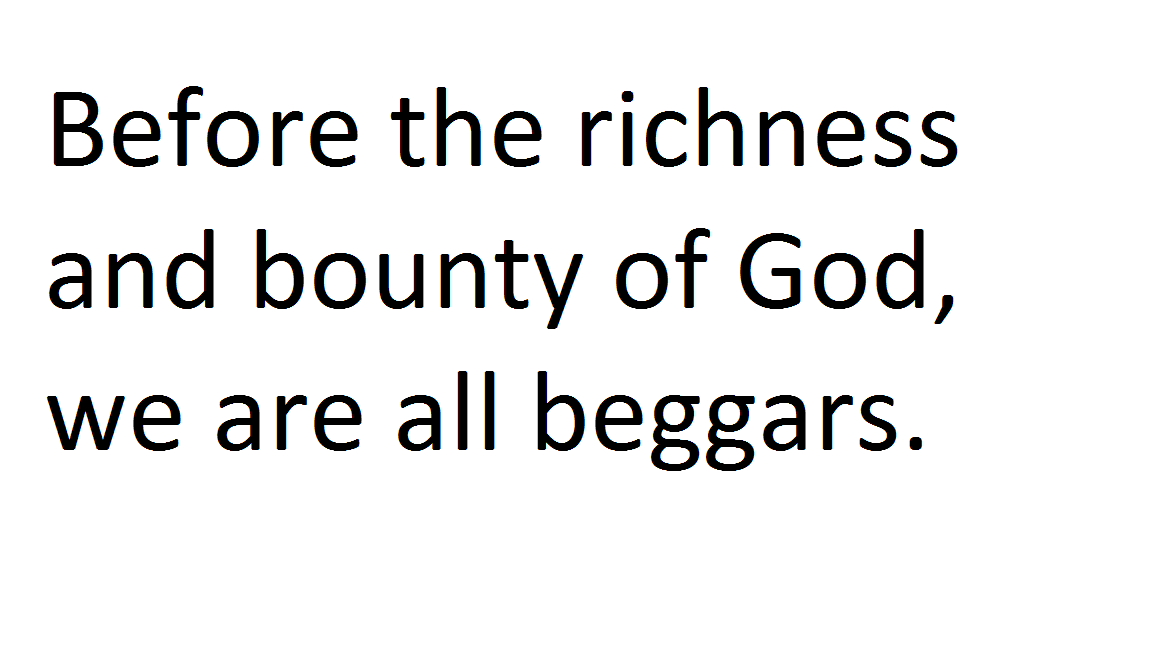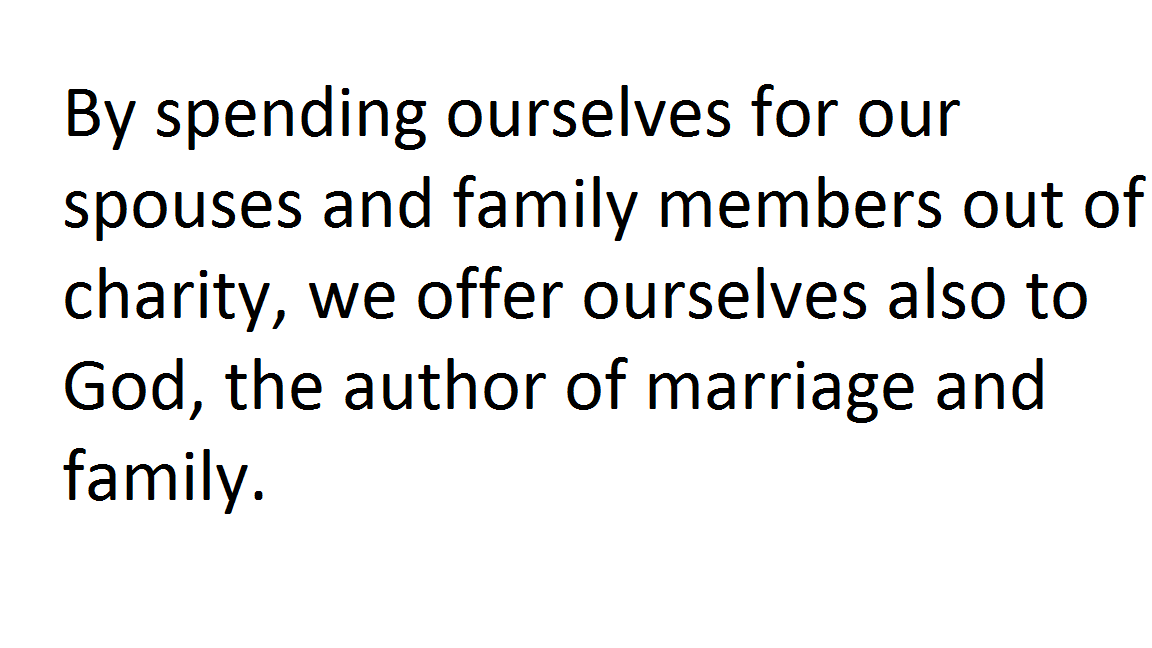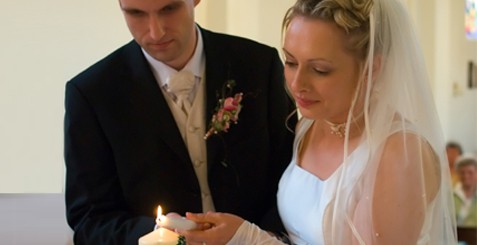Blessed are the poor in spirit, for theirs is the kingdom of heaven. (Mt 5:3)
The proud seek an earthly kingdom, of the humble only is the kingdom of Heaven. (St. Augustine)
This first Beatitude is for the “poor in spirit,” to whom the kingdom of heaven belongs. St. Augustine says that the kingdom of heaven belongs only to the humble. So there must be some connection between poverty of spirit and humility; the two are bound together.
So just what does it mean to be poor in spirit? Notice that Christ connects poverty with a kingdom—an unusual juxtaposition! We do not often think of the poor man as someone who owns a kingdom. But here Christ speaks of a poverty that is spiritual, not material, and a kingdom that is heavenly, not earthly. Poverty always involves some lack. In the course of our lives, it can take a great number of forms, each involving a lack of some kind: suffering, loneliness, old age, illness, etc.
 But everyone deals with these things—so is everyone poor? Well, in some way, yes. But spiritual poverty is a particular kind of poverty, in which we all share by our nature: before the richness and bounty of God, we are all beggars. Here we can make sense of St. Augustine’s comment on humility. The man who is truly poor in spirit recognizes his lowliness and poverty before God, and this is humility. It has been said that true humility is not excessive self-abasement but seeing things as they really are. The ability to see one’s own poverty before God is no exception.
But everyone deals with these things—so is everyone poor? Well, in some way, yes. But spiritual poverty is a particular kind of poverty, in which we all share by our nature: before the richness and bounty of God, we are all beggars. Here we can make sense of St. Augustine’s comment on humility. The man who is truly poor in spirit recognizes his lowliness and poverty before God, and this is humility. It has been said that true humility is not excessive self-abasement but seeing things as they really are. The ability to see one’s own poverty before God is no exception.
Pope Emeritus Benedict XVI recently said that everyone who calls himself Christian must be “the last in the opinion of the world.” What could be poorer or humbler than this? We Christians are called to humility and poverty of spirit, virtues which have always been met with opposition and animosity from the world (it’s no secret that the world generally tends to look down on the poor). We who uphold the truth about marriage—namely, that it can only be a union of one man and one woman—frequently experience this opposition and animosity. In this way we can see that there is a certain poverty about defending truth, because we do not defend a truth that comes from ourselves, and a certain humility about defending truth, because it requires us to see things as they really are.
What of family? How can we live a poverty of spirit in our family lives? As I mentioned, the various lacks in our lives indicate our poverty—but spiritual poverty is a special kind of lack. The man who is poor in spirit, recognizing his status as a beggar before God, offers his entire self to God for God’s sake. In both marriage and family life, this involves an offering of self. By spending ourselves for our spouses and family members out of charity, we offer ourselves also to God, the author of marriage and family. In this way we become poor and humble, and better prepare ourselves to receive the gift God most wants to give us: himself.
 This notion of self-gift, both ours and God’s, is worth exploring further. We speak of Christ as the true Bridegroom and of the Church as his Bride—this goes all the way back to St. Paul’s beautiful and theologically rich words about marriage in the letter to the Ephesians (5:21-33). St. Paul himself says that the union between husband and wife and its relation to the union between Christ and the Church is a great mystery: “great,” not just in the sense of “difficult to understand,” but in the sense of “awe-inspiring” and even “life-giving”—the only other place St. Paul talks about a “great mystery” is in reference to the Incarnation, when God himself came among us as a man (cf. 1 Tim 3:16). So it’s striking that he speaks of the great mystery of Christ’s union with the Church in almost the same breath as the union between husband and wife. Indeed, not only does the union of marriage through self-gift serve as an image of the union of Christ with the Church through his perfect self-gift; marriage is given to mankind as a means for husband and wife to participate in this union with our Lord: marriage raises us to God.
This notion of self-gift, both ours and God’s, is worth exploring further. We speak of Christ as the true Bridegroom and of the Church as his Bride—this goes all the way back to St. Paul’s beautiful and theologically rich words about marriage in the letter to the Ephesians (5:21-33). St. Paul himself says that the union between husband and wife and its relation to the union between Christ and the Church is a great mystery: “great,” not just in the sense of “difficult to understand,” but in the sense of “awe-inspiring” and even “life-giving”—the only other place St. Paul talks about a “great mystery” is in reference to the Incarnation, when God himself came among us as a man (cf. 1 Tim 3:16). So it’s striking that he speaks of the great mystery of Christ’s union with the Church in almost the same breath as the union between husband and wife. Indeed, not only does the union of marriage through self-gift serve as an image of the union of Christ with the Church through his perfect self-gift; marriage is given to mankind as a means for husband and wife to participate in this union with our Lord: marriage raises us to God.
~
This series is a guest contribution by a Dominican student brother who has been fulfilling his pastoral ministry assignment by serving as an intern at the USCCB’s Secretariat for Laity, Marriage, Family Life, and Youth.

This is an important contribution to Marriage and Family Spirituality and my wife Joy and I look forward to sharing it on AT HOME WITH JIM and JOY on EWTN Global Catholic Radio. Keep up your important work. God bless For Your Marriage!
A beautiful correlation between poor in spirit and marriage. I was blown away with the image of our poverty before Gods richness. Marriage as a sacrament can also help us to see Gods richness in our spouses.